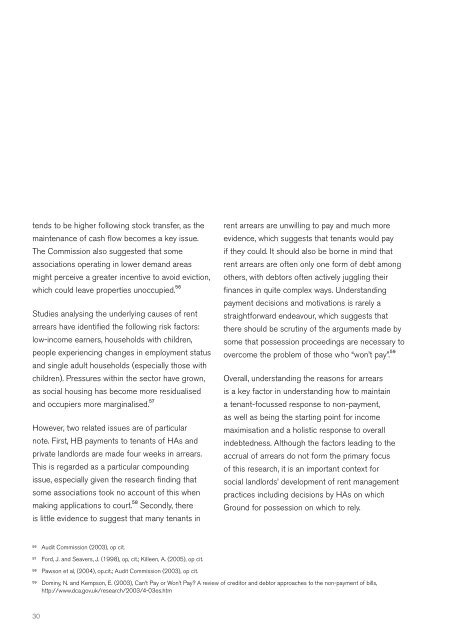Rent arrears management practices in the housing association sector
Rent arrears management practices in the housing association sector
Rent arrears management practices in the housing association sector
Create successful ePaper yourself
Turn your PDF publications into a flip-book with our unique Google optimized e-Paper software.
tends to be higher follow<strong>in</strong>g stock transfer, as <strong>the</strong><br />
ma<strong>in</strong>tenance of cash flow becomes a key issue .<br />
The Commission also suggested that some<br />
<strong>association</strong>s operat<strong>in</strong>g <strong>in</strong> lower demand areas<br />
might perceive a greater <strong>in</strong>centive to avoid eviction,<br />
which could leave properties unoccupied . 56<br />
Studies analys<strong>in</strong>g <strong>the</strong> underly<strong>in</strong>g causes of rent<br />
<strong>arrears</strong> have identified <strong>the</strong> follow<strong>in</strong>g risk factors:<br />
low-<strong>in</strong>come earners, households with children,<br />
people experienc<strong>in</strong>g changes <strong>in</strong> employment status<br />
and s<strong>in</strong>gle adult households (especially those with<br />
children) . Pressures with<strong>in</strong> <strong>the</strong> <strong>sector</strong> have grown,<br />
as social hous<strong>in</strong>g has become more residualised<br />
and occupiers more marg<strong>in</strong>alised . 57<br />
However, two related issues are of particular<br />
note . First, HB payments to tenants of HAs and<br />
private landlords are made four weeks <strong>in</strong> <strong>arrears</strong> .<br />
This is regarded as a particular compound<strong>in</strong>g<br />
issue, especially given <strong>the</strong> research f<strong>in</strong>d<strong>in</strong>g that<br />
some <strong>association</strong>s took no account of this when<br />
mak<strong>in</strong>g applications to court . 58 Secondly, <strong>the</strong>re<br />
is little evidence to suggest that many tenants <strong>in</strong><br />
56 Audit Commission (2003), op cit .<br />
57 Ford, J . and Seavers, J . (1998), op, cit .; Killeen, A . (2005), op cit .<br />
58 Pawson et al, (2004), op .cit .; Audit Commission (2003), op cit .<br />
30<br />
rent <strong>arrears</strong> are unwill<strong>in</strong>g to pay and much more<br />
evidence, which suggests that tenants would pay<br />
if <strong>the</strong>y could . It should also be borne <strong>in</strong> m<strong>in</strong>d that<br />
rent <strong>arrears</strong> are often only one form of debt among<br />
o<strong>the</strong>rs, with debtors often actively juggl<strong>in</strong>g <strong>the</strong>ir<br />
f<strong>in</strong>ances <strong>in</strong> quite complex ways . Understand<strong>in</strong>g<br />
payment decisions and motivations is rarely a<br />
straightforward endeavour, which suggests that<br />
<strong>the</strong>re should be scrut<strong>in</strong>y of <strong>the</strong> arguments made by<br />
some that possession proceed<strong>in</strong>gs are necessary to<br />
overcome <strong>the</strong> problem of those who “won’t pay” . 59<br />
Overall, understand<strong>in</strong>g <strong>the</strong> reasons for <strong>arrears</strong><br />
is a key factor <strong>in</strong> understand<strong>in</strong>g how to ma<strong>in</strong>ta<strong>in</strong><br />
a tenant-focussed response to non-payment,<br />
as well as be<strong>in</strong>g <strong>the</strong> start<strong>in</strong>g po<strong>in</strong>t for <strong>in</strong>come<br />
maximisation and a holistic response to overall<br />
<strong>in</strong>debtedness . Although <strong>the</strong> factors lead<strong>in</strong>g to <strong>the</strong><br />
accrual of <strong>arrears</strong> do not form <strong>the</strong> primary focus<br />
of this research, it is an important context for<br />
social landlords’ development of rent <strong>management</strong><br />
<strong>practices</strong> <strong>in</strong>clud<strong>in</strong>g decisions by HAs on which<br />
Ground for possession on which to rely .<br />
59 Dom<strong>in</strong>y, N . and Kempson, E . (2003), Can’t Pay or Won’t Pay? A review of creditor and debtor approaches to <strong>the</strong> non-payment of bills,<br />
http://www .dca .gov .uk/research/2003/4-03es .htm




